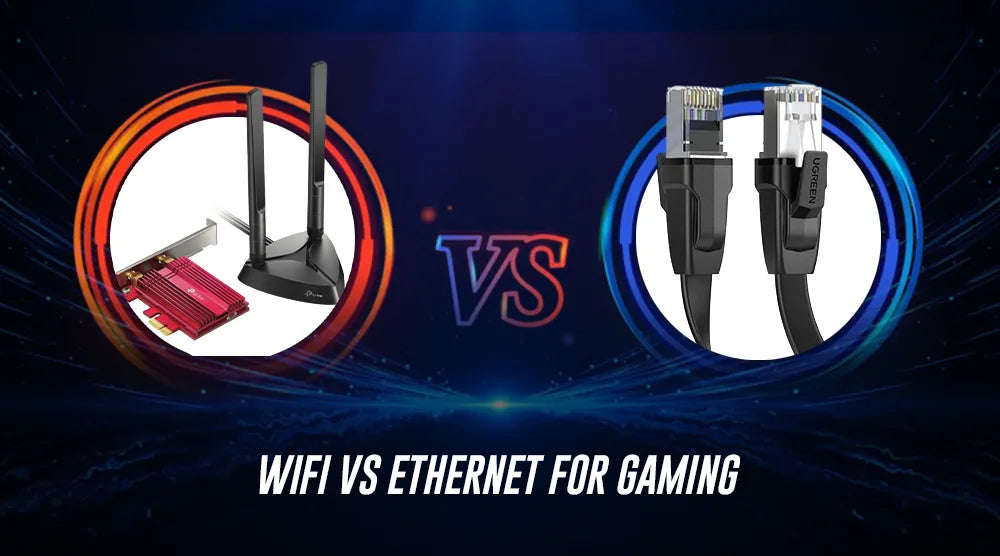In gaming, the power of your internet connection can be the difference between winning and losing. With two options to work with, WiFi and Ethernet, the superior one for your gaming will be up to it.
When it comes to WiFi, is it a wireless networking technology that requires radio waves to provide internet access with wireless high speed. On the other hand, Ethernet is a tech system to connect various systems simultaneously for achieving local area network.
A fast gaming network connection translates to less lag, critical for split-second decisions in games where milliseconds count. Both technologies are handy but have their own set of disadvantages.
In this blog, let’s discover which is the best connection, WiFi or Ethernet. Moreover, we’ll be analyzing the advantages and disadvantages of each of them to choose the right one.
WiFi for Gaming
Advantages of WiFi for Gaming
-
Convenience and Wireless Mobility: The best part about WiFi is how convenient it is. You can play anywhere in your house, bed or couch, without the need for cables holding you back. This is really convenient if you have multiple gaming stations or prefer to change where you game from time to time.
-
Easy Setup and Use: WiFi is easier to install. Once your router is installed, devices can subsequently be plugged in without the utilization of additional hardware. This will be ideal when cabling is going to look ugly or awful.
Issues with WiFi Gaming
-
Increased Latency and Potential Lag: WiFi waves propagate in the air, and this can result in lag or delays. Lag can be the time between connecting a shot or failing to connect a shot in speed-based games, which can affect your performance in competitive situations.
-
Signal Interference: Physical barriers like floors, walls, and even furniture can impair WiFi signals. Additionally, interference from other wireless devices, even neighboring WiFi, can further disrupt your gaming network connection. The more distant you are from the router, the weaker the signal will be.
-
Bandwidth Constraints: With you sharing the network, your game will be affected when everyone connects their internet for maximum usage. Other gamers playing video calls, streaming, or downloading will degrade bandwidth for your game, leading to poor performance.
Best Scenarios for WiFi in Gaming
-
Casual Game and Non-Competitive Atmosphere: When your games aren't split-second timing affairs, WiFi's simplicity is more than worth the loss of a small amount of performance drag. Single-player games, casual gaming, or games which don't rely heavily on real-time interaction are suitable for WiFi.
-
Single-Player Titles or Low-Data Usage Games: Those games that involve no constant high-speed data exchange or where latency doesn't matter can be played via WiFi. RPGs, non-online content strategy games, or local multiplayer titles are the first to come to mind.
Ethernet for Gaming
Benefits of Ethernet for Gaming
-
Sturdy and Reliable Connection: Offers low-latency gaming setup, which equates to quicker response times.
-
Lower Latency for Quick Response Times: Essential for competitive gaming.
-
Constant Speeds for Smooth Play: No variation, providing a less unpredictable experience.
Limitations of Ethernet for Gaming
-
Wired Setup Can Be Confining: Limits where you set up your gaming platform.
-
Installation Difficulties with Longer Distances: More planning or expenditure in long cabling.
Optimal Situations for Ethernet in Gaming
-
Competitive and Online Multiplayer Gaming: Where milliseconds are crucial.
-
High-usage Games: Like first-person shooters or real-time strategy games where data transmission must be uninterrupted.
WiFi vs Ethernet Gaming: Performance Comparison
Latency and Ping
-
Ethernet will likely have lower ping, i.e., faster game response.
-
Good latency ranges are dependent on the type of game, but less than 30ms is typically well-suited to gaming.
Speed and Bandwidth
-
Ethernet provides consistent speed, ideal for streaming or downloading in play.
-
WiFi could be inconsistent, especially when many devices are attached.
Reliability for Network Stability
-
Ethernet reduces the chance of packet loss and dropping out.
-
WiFi can be optimized through quality-of-service settings to prioritize gaming traffic.
Tips for Optimizing Your Gaming Connection
Improving WiFi Performance
-
Use dual-band or tri-band routers to manage heavy loads.
-
Position your router in the middle and elevate it on a raised platform to provide more extended coverage.
-
Upgrade to WiFi 6 for increased speed and capacity.
Optimizing Ethernet Setup
-
Use Cat6 or Cat7 cables for improved performance.
-
Shield cables from sources of interference like power lines.
-
Employ network switches to provide wired connectivity with no loss of signal.
Backup Solutions
Ethernet and WiFi combined for redundancy in case one fails.
Final Thoughts
In conclusion, selecting the appropriate internet connection—Wi-Fi or Ethernet—depends on your gaming needs. For competitive gaming, Ethernet offers lower latency and higher stability, ensuring a seamless experience. Conversely, Wi-Fi provides the convenience of mobility, making it suitable for casual gaming. Assess your priorities to choose the connection that best aligns with your gaming style.
For expert insights and the latest updates in the world of technology and gaming, visit Technoid Inc. today!
Mostly Asked Questions
Q1: Is WiFi ever going to be as good as Ethernet for gaming?
While WiFi has gotten a lot better, Ethernet typically carries a low-latency gaming setup with stronger connections, which is paramount for gaming competitions. With the recent upgrade to WiFi 6, this difference will become much smaller.
Q2: How do I reduce lag when I'm only able to use WiFi?
Bring your router nearer to gaming equipment, reduce interference, and employ mesh units or WiFi boosters to extend the coverage.
Q3: Worth paying for hard wire Ethernet in my house for gaming?
You bet if you are a hardcore gamer. Heating up the coffers by investing in Ethernet could mean lower latency and a more secure experience, thus helping you come out ahead of the game against the competition.

 United States
United States

